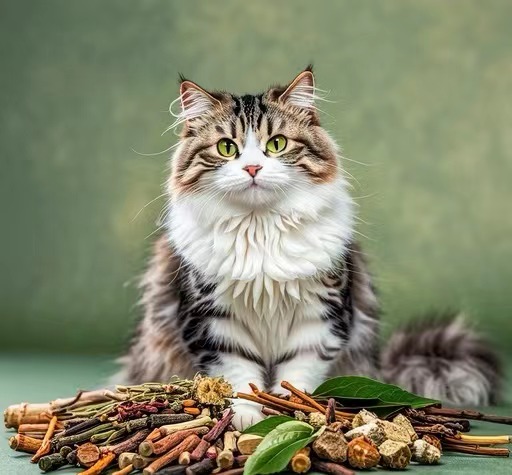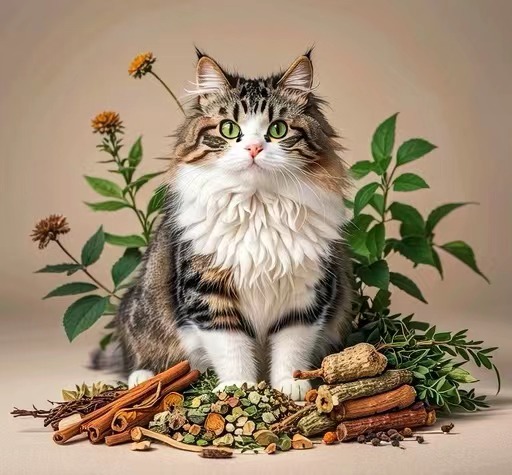
by TCMVET | Mar 4, 2024 | Cat Cancer & Tumors
The early detection of cancer in cats is crucial for successful treatment and improved prognosis. While modern veterinary medicine has made significant strides in diagnosing and treating cancer, incorporating herbal preventions and understanding early indicators can play a vital role in safeguarding your cat’s health. This article explores how certain herbs may aid in prevention and highlights key signs to watch for early cancer detection in felines.
- Understanding Cancer in Cats:
- Briefly explain the common types of cancer in cats, such as lymphoma, mammary cancer, and skin cancer.
- Discuss the importance of early detection for effective treatment.
- Herbal Prevention Strategies:
- Introduce the concept of using herbs as a preventive measure against cancer in cats.
- Highlight specific herbs known for their cancer-preventive properties, like Turmeric (Curcumin), Green Tea, and Milk Thistle, and how they can be incorporated into a cat’s diet.
- Early Indicators of Cancer in Cats:
- List and explain early signs of cancer in cats, such as unexplained weight loss, persistent sores, changes in bowel or bladder habits, difficulty eating or swallowing, and lethargy.
- Emphasize the importance of regular veterinary check-ups for early detection.
- Integrating Herbal Prevention with Regular Veterinary Care:
- Discuss how herbal preventions can complement regular veterinary check-ups and diagnostics.
- Offer advice on working with a veterinarian to safely include herbal supplements in a cat’s health regimen.
- Case Studies and Research:
- Share research findings and case studies that support the use of herbal preventions in reducing cancer risk in cats.
- Include testimonials from cat owners and veterinarians.
- Potential Risks and Side Effects:
- Address the possible risks and side effects associated with herbal supplements and the importance of proper dosage and administration.
- Lifestyle and Environmental Factors:
- Discuss additional factors that can influence a cat’s cancer risk, such as diet, exercise, and environmental toxins.
Early detection of cancer in cats is key to successful treatment. Herbal preventions, alongside regular veterinary care, offer a proactive approach to maintaining your cat’s health. Stay vigilant for early indicators of cancer and consult with your veterinarian to create an effective and safe health plan for your feline friend.

by TCMVET | Mar 3, 2024 | Cat Cancer & Tumors
The intersection of traditional Chinese herbal medicine and modern veterinary care is opening new avenues in treating cat cancer. “Paws and Plants” explores how these ancient herbs can complement conventional therapies, offering a holistic approach to feline health.
Understanding Cat Cancer
Cancer in cats can be as complex and varied as in humans, with types like lymphoma, mammary gland tumors, and skin cancer being prevalent. Recognizing early signs is key to effective treatment and improved outcomes.
The Basis of Chinese Herbal Medicine in Cancer Care
Chinese herbal medicine, rooted in a tradition thousands of years old, focuses on restoring balance within the body. It employs a range of herbs that are believed to possess properties beneficial in fighting cancer and mitigating treatment side effects.
Key Herbs in Feline Cancer Treatment
- Astragalus (Huang Qi): Known to boost the immune system and potentially inhibit tumor growth.
- Dang Gui (Angelica Sinensis): Often used for its nourishing properties, it may help in revitalizing cats undergoing cancer treatment.
- Jin Yin Hua (Honeysuckle): Used for its anti-inflammatory and antiviral properties.
- Ginseng (Ren Shen): A well-known adaptogen, aiding in overall health and vitality.
Integrating Herbal Medicine with Conventional Cancer Treatments
Integrating Chinese herbal medicine with conventional cancer treatments like chemotherapy and radiation therapy can offer a more comprehensive approach. This integration should always be done under the guidance of a veterinarian skilled in both areas.
Research and Studies on Herbal Medicine in Veterinary Oncology
There is a growing body of research that supports the use of Chinese herbal medicine in conjunction with conventional cancer treatments. Studies have shown these herbs can help reduce side effects, improve quality of life, and sometimes enhance the efficacy of conventional treatments.
Case Studies: Success with Integrative Approaches
Anecdotal evidence and case studies have highlighted success stories where integrative approaches have benefited feline patients, leading to better tolerance of conventional treatments and improved overall well-being.
The Future of Herbal Medicine in Cat Cancer Care
As interest in holistic and integrative medicine grows, the role of Chinese herbal medicine in veterinary oncology is poised for expansion. Ongoing research and clinical trials will continue to shape and define its role in cancer care.
“Paws and Plants” underscores the potential of integrating Chinese herbal medicine in cat cancer care. This approach offers a more holistic path to treatment, aiming to enhance the quality of life for our feline companions during their cancer journey.

by TCMVET | Mar 3, 2024 | Cat Cancer & Tumors
Cancer in cats is a significant health concern, but natural treatments like herbal remedies offer a ray of hope. “Herbs for Health” provides an in-depth look at how these natural solutions can be used to treat feline cancer, emphasizing a holistic approach to pet health.
Understanding Feline Cancer
Feline cancer manifests in various forms, including lymphoma, mammary cancer, and skin cancer. Early detection is crucial for effective treatment. Symptoms can range from unexplained weight loss to changes in behavior or appearance.
The Role of Herbal Remedies in Cancer Treatment
Herbal remedies have been used in traditional medicine for centuries to treat various ailments, including cancer. These natural solutions can support conventional cancer treatments by boosting the immune system, reducing side effects, and improving overall quality of life.
Key Herbs for Feline Cancer Treatment
- Turmeric (Curcuma longa): Contains curcumin, known for its anti-inflammatory and anti-cancer properties.
- Milk Thistle (Silybum marianum): Supports liver function, helping to detoxify the body during cancer treatments.
- Astragalus (Huang Qi): Enhances immune function and may help in tumor reduction.
- Cat’s Claw (Uncaria tomentosa): Known for its immune-boosting and anti-tumor effects.
Integrating Herbal Treatments with Conventional Therapies
Herbal remedies should complement, not replace, conventional cancer treatments. Collaboration with a veterinarian is essential to create a balanced treatment plan that combines the best of both worlds.
Research and Evidence Supporting Herbal Treatments
While research on herbal treatments for feline cancer is ongoing, several studies have shown promising results. These studies suggest that herbs can play a supportive role in cancer treatment, helping to improve the effectiveness of conventional therapies.
Case Studies and Success Stories
Numerous pet owners have reported positive effects of herbal treatments on their cats’ health and well-being during cancer treatment. These anecdotal experiences provide valuable insights into the potential benefits of herbal remedies.
The Future of Herbal Treatments in Veterinary Medicine
As interest in holistic and natural treatments grows, the role of herbal remedies in veterinary medicine is expected to expand. Ongoing research will be crucial in validating and refining these treatments.
“Herbs for Health: A Guide to Treating Feline Cancer Naturally” offers a comprehensive overview of how herbal remedies can support the treatment of cancer in cats. By embracing these natural solutions, pet owners can contribute to the overall well-being and longevity of their feline companions.

by TCMVET | Mar 3, 2024 | Cat Cancer & Tumors
Feline cancer is a growing concern among pet owners. However, the ancient wisdom of Eastern medicine offers promising herbal remedies. This article explores how traditional herbs can be a vital ally in the fight against feline cancer.
Understanding Feline Cancer
Cancer in cats can manifest in various forms, including lymphoma, squamous cell carcinoma, and mammary cancer. Recognizing early symptoms such as weight loss, lethargy, or abnormal swellings is crucial for early intervention.
The Role of Eastern Herbs in Cancer Treatment
Traditional Eastern medicine, with its holistic approach, uses a variety of herbs to treat not just the symptoms but the root cause of diseases. In the context of feline cancer, these herbs are used to strengthen the body’s natural defenses and combat the growth of cancer cells.
Key Herbs and Their Properties
- Turmeric (Curcuma longa): Contains curcumin, known for its anti-inflammatory and anti-cancer properties.
- Astragalus (Huang Qi): Boosts the immune system and may help in reducing tumor growth.
- Ginseng (Ren Shen): An adaptogen that enhances overall health and vitality.
- Green Tea (Camellia sinensis): Rich in antioxidants, it can help in preventing cell damage.
Integrating Herbs with Conventional Cancer Therapies
While traditional herbs offer many benefits, they should be used in conjunction with conventional cancer treatments. Collaboration between veterinarians and herbal medicine practitioners is vital to ensure a safe and effective integrated treatment plan.
Evidence and Research in Herbal Oncology
Research in the field of herbal oncology, though still in its nascent stages, shows promising results. Studies indicate that certain herbs can reduce tumor size and enhance the effectiveness of conventional treatments.
Case Studies: Successes in Feline Herbal Treatments
Several case studies and anecdotal reports suggest that herbal treatments can improve the quality of life and longevity of cats with cancer. These stories offer hope and pave the way for more formal research.
The Future of Herbal Medicine in Veterinary Oncology
The integration of traditional herbs into veterinary oncology is an evolving field. As more research is conducted, it could lead to more effective and personalized treatment plans for feline cancer.
“Eastern Promise: Traditional Herbs in the Fight Against Feline Cancer” highlights the potential of herbal remedies as part of a comprehensive cancer treatment plan. These ancient practices, combined with modern veterinary medicine, offer a holistic approach to enhancing the health and well-being of cats.

by TCMVET | Mar 3, 2024 | Cat Cancer & Tumors
Cancer in cats is a concern for every pet owner. With advancements in veterinary medicine, herbal treatments have emerged as a supportive approach. “Whiskers and Wellness” provides an insight into how herbal remedies can aid in the fight against feline cancer.
The Rise of Cancer in Cats
As cats live longer due to improved care, the incidence of cancer increases. Common types include lymphoma, mammary cancer, and skin cancer. Early detection and treatment are key, but the journey doesn’t end there.
Herbal Treatments: Nature’s Healing Touch
Herbal treatments, used for centuries in human medicine, are now gaining traction in veterinary care. These natural remedies offer a gentler approach, potentially enhancing the quality of life for cats with cancer.
Popular Herbs for Feline Cancer
Several herbs are known for their cancer-fighting properties:
- Turmeric (Curcuma longa): Contains curcumin, which has anti-inflammatory and anti-cancer effects.
- Milk Thistle (Silybum marianum): Supports liver function, crucial in metabolizing cancer medications.
- Astragalus (Huang Qi): Boosts the immune system and may help in fighting tumors.
- Cat’s Claw (Uncaria tomentosa): Another immune system booster with anti-tumor properties.
Integrating Herbal Remedies with Conventional Cancer Treatments
Herbal remedies can complement traditional cancer treatments like chemotherapy. They may alleviate side effects and improve overall well-being. However, it’s crucial to consult with a veterinarian before starting any herbal treatment.
The Science Behind Herbal Remedies
While research in this area is still evolving, some studies suggest a positive impact of herbal remedies on cancer. These natural treatments can reduce inflammation, strengthen the immune system, and potentially inhibit tumor growth.
Case Studies and Success Stories
Many pet owners have turned to herbal remedies, often reporting improved quality of life for their cats. These anecdotes, while not definitive, suggest a potential benefit worth exploring.
The Future of Herbal Treatments in Veterinary Oncology
As interest in holistic pet care grows, so does the exploration of herbal treatments in veterinary oncology. The future looks promising, with ongoing research and a growing acceptance of integrative approaches.
“Whiskers and Wellness” sheds light on the potential of herbal treatments in managing cat cancer. By combining traditional and natural remedies, we can offer our feline friends a better chance at a comfortable, healthier life.

by TCMVET | Mar 3, 2024 | Cat Cancer & Tumors
Cancer in cats is a daunting challenge, but hope lies in nature’s bounty. Chinese herbs have been used for centuries to treat various ailments, and their role in combating feline cancer is gaining interest. This article delves into how these ancient remedies can be a game-changer in the fight against cancer in our feline friends.
The Prevalence of Cancer in Cats
Feline cancer is not uncommon and can affect cats of any age, though it’s more prevalent in seniors. Types of cancer in cats include lymphoma, skin cancer, and mammary gland cancer, each with different symptoms and treatment options.
Chinese Herbs: An Ancient Solution
Chinese herbal medicine, part of Traditional Chinese Medicine (TCM), uses a variety of plants and herbs to treat diseases. In the context of feline cancer, these herbs aim to strengthen the immune system, inhibit tumor growth, and alleviate the side effects of conventional cancer treatments.
Key Chinese Herbs for Feline Cancer
- Astragalus (Huang Qi): Known for boosting immunity and potentially inhibiting tumor growth.
- Dong Quai (Dang Gui): Used for its blood-tonifying properties, important in cancer care.
- Ginseng (Ren Shen): A powerful adaptogen that can improve overall vitality.
- Turmeric (Jiang Huang): Contains curcumin, with its anti-inflammatory and anti-cancer properties.
Integrating Chinese Herbs with Conventional Treatments
While Chinese herbs offer promising benefits, they should not replace conventional cancer treatments. Instead, they can be used alongside chemotherapy or radiation to enhance effectiveness and reduce side effects. Consultation with a veterinarian knowledgeable in both Western and Eastern medicine is crucial.
The Science Behind Chinese Herbs in Cancer Treatment
Recent studies have begun to explore the efficacy of Chinese herbs in cancer treatment, with some showing positive effects on immune function and tumor inhibition. More research is needed, but the potential is promising.
Real-Life Success Stories
Numerous anecdotes from pet owners suggest that Chinese herbs have helped their cats live longer and more comfortably with cancer. These stories, while not scientific evidence, offer hope and insight into the potential of herbal treatments.
The Future of Herbal Treatment in Veterinary Oncology
As interest in holistic and integrative veterinary medicine grows, so too does the exploration of herbal treatments in cancer care. The future of these treatments looks bright, with ongoing research and a growing body of anecdotal evidence.
“Nature’s Cure: Using Chinese Herbs to Fight Cancer in Cats” highlights the potential of Chinese herbal medicine as a complementary treatment in feline cancer care. These ancient remedies, combined with modern veterinary science, offer a holistic approach to improving the quality of life for cats with cancer.







